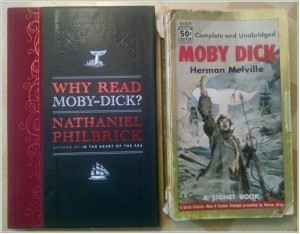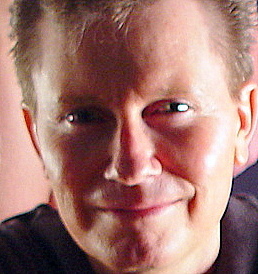Writing on the Ether

iStockphoto / steinphoto
Capt. Linn warned us: "Too many books!"
So no, yeah, whoa, the heaving ship of publishing lists to starboard, everybody to the rails, it's Frankfurt! And then achtung, now we're Dramamine-ing to portside as they all skitter back, 'twixt poop deck and TweetDeck, tote bags stuffed with digital drama. And my God, shall not the ebook's stormy perfection sweep us overboard before next we raise the Liebfraumilch? (Fraulein Merkel will have the retsina, efharisto.)
The Big Six are not too big to wail when #publauncher Mike Shatzkin reaffirms his 80-percent e-vision on the German mountaintop. Once only the flare-up of new literature could rend the air like these devices Fired over our bow by Lord Bezos, pull!
Wasn't it just last week I mentioned content? C-o-n-t-e-n-t. Well, tweet faster, then, matey! And what, with this BlackBerry? I'll bet our gal Siri will be able to read the Captain's too-many books to him in her comely alto. Just keep your iPhone 4S away from babies thought to mistake magazines for iPads. Did no one ask if the baby enjoyed a single article in that 'zine?
O Captain! My Captain! Sweet content so struggles to find herself a spot in the lifeboats, and all I know to ask you is this: Will Siri dream?
#bbpBox_125752260889284608 a { text-decoration:none; color:#1F98C7; }#bbpBox_125752260889284608 a:hover { text-decoration:underline; }For 1-Year-Old Girl, Magazines Are iPads That Do Not Work http://t.co/vT2zikVm [vid] cc @October 16, 2011 9:57 pm via HootSuite Reply Retweet Favorite Andrew D. Nystrom
Captain's Log: Baby lit and the bookfairies
Confirmed once again that there are way too many books. Childrens books seem particularly grossly over-represented.
I *thought* I saw lots of agents and it turns out that the number of agents was up 11% over 2010. I'm not entirely sure what to make of that.
There were an inordinate number of nuns in attendance. Were they agents in disguise?
Agent Andrew Wylie continues to say outrageous things like "distribution fees should be zero". This doesn't advance the conversation.
The bratwurst from the street vendors is better than restaurant brats any day.
Need I say more? No, of course not, because our Capt. Don Linn says it all, so well, in his Bait 'n' Beer, Random Impressions From Frankfurt
#bbpBox_126049221609652224 a { text-decoration:none; color:#6fbf00; }#bbpBox_126049221609652224 a:hover { text-decoration:underline; }He's right abt the brats ;-) MT @October 17, 2011 5:37 pm via Tweetbot for iPhone Reply Retweet Favorite Small Demons
A "tsunami wave of amateur writing"
We need a new screening process in the industry: there are far too many aspiring writers, far too many aspiring agents, far too few publishers. The numbers are skewed to the point that they're unmanageable.
That's editor and author Victoria Mixon in 3 Things You Need to Know About the New Publishing Industry. Might these be early longings for the professional-spine-gone-missing? Now, as Mixon puts it, "So much of what's being published is published for reasons other than quality—topic, marketing, authors' names." Pair that with this post from agent Rachelle Gardner who also places the burden of craft where it belongs, on the writer, in her Master the Craft of Writing:
More books (are) getting into readers' hands without benefit of the level of tender loving care that used to be considered normal. Why does it matter? Because readers can tell the difference… They know when a book is good enough to not only finish, but recommend to their friends. They know when a book was amazing or "meh" or awful. They may not always know why, but they know. They also know when there are typos or elementary mistakes in grammar or punctuation. And in those online reviews, they're vocal about these kinds of mistakes.
#bbpBox_126691596866551809 a { text-decoration:none; color:#e31010; }#bbpBox_126691596866551809 a:hover { text-decoration:underline; }I think I need to sit down and write a pleasant, happy, non-controversial blog post now. That will be a nice change.[image error]about 19 hours ago via TweetDeck Reply Retweet Favorite Rachelle Gardner
Glad to say, she hasn't sat down yet
It is not the publishing industry who put a computer in more than half of all American households, allowing millions of folks just like yourself to write books which they then want to sell … Part of the value publishers bring is a sense of history, a sense of tradition and permanence. Many authors still want to be a part of that.
Apparently taking heat for pushing would-be authors to face Publishing in the Brave New World, Rachelle Gardner rightly holds her ground and writes, "Those of you who find yourself bemoaning that 'writers are expected to do everything" … perhaps the self-publishing route will work out better for you."
#bbpBox_126700950592299009 a { text-decoration:none; color:#e88d17; }#bbpBox_126700950592299009 a:hover { text-decoration:underline; }After no Internet all morning, now I am REALLY behind. Need a break and some food...THEN I go all ninja #MyWANA[image error]about 18 hours ago via TweetDeck Reply Retweet Favorite Kristen Lamb
The *kavalry comes over the hill
I'm here to help you guys understand that Rachelle is actually on our side, and the idea of numbers should not scare you. Numbers can be a writer's best friend. … When we focus on authentic relationships instead of super high "numbers" we actually will raise the number that counts—the *Klout score. This is one of the reasons that writers are better off narrowing their focus and not "participating" on ten different sites. It spreads us too thinly, and, in the end it will negatively impact our Klout.
Following up on her post here in Janesville, author Kristen Lamb gets at why the Klout score, scoffed at by some of the technorati, may smell like a yellow rose for Writers (in) the Wild World of Metrics
#bbpBox_124488609070977024 a { text-decoration:none; color:#009999; }#bbpBox_124488609070977024 a:hover { text-decoration:underline; }I love when @October 13, 2011 10:16 am via web Reply Retweet Favorite Christian Carey
Then again, digital didn't create agent-publishers
It seems that Curtis Brown decided to rethink their move into publishing. Instead, they have announced a deal to sell 520 books en masse to a new imprint owned by Pan Macmillan created especially to house these books. … It is interesting to note that Macmillan set up a separate imprint, Macmillan Bello, for this special deal negotiated by Curtis Brown. Could it be possible that Macmillan Bello is a disguised version of agent-as-publisher?
That's David Gaughran writing Literary Agency Sells 520 Books In One Deal, Raising Questions, adding that nothing has been heard "about advances, royalty rates, or anything like that."
#bbpBox_126690478698668032 a { text-decoration:none; color:#009999; }#bbpBox_126690478698668032 a:hover { text-decoration:underline; }Curtis Brown UK sold 520 titles IN ONE DEAL. So much for agents getting right deal for right book: http://t.co/XOP3FwQz[image error]about 19 hours ago via Brizzly Reply Retweet Favorite Will Entrekin
And digital didn't morph the genres, either
Only eleven years into a new century, American literary culture has undergone a sea change. A group of high-profile literary writers have fled the place we call "real life"—and their numbers are growing. … Today's serious writers are hybrid creatures—yoking the fantasist scenarios and whiz-bang readability of popular novels with the stylistic and tonal complexity we expect to find in literature. Meet the New Mutants of American fiction.
That's Joe Fassler writing of How Zombies and Superheroes Conquered Highbrow Fiction, allowing himself maybe just one rub-up against digital warmth: "Our day-to-day lives are becoming more science-fictional. "
#bbpBox_126550513356513280 a { text-decoration:none; color:#990000; }#bbpBox_126550513356513280 a:hover { text-decoration:underline; }How Do I Find an Agent? — Genre! http://t.co/Fvkc5yqk via @October 19, 2011 2:49 am via Su.pr Reply Retweet Favorite Joanna Penn
Another ship, another captain, another agent

Photo: Jason Ashlock, The Naked Book
It reminded me why I didn't shut this book ten years ago in an undergraduate American literature class and toss it in the corner, in favor of the Sparknotes or the Reader's Digest abridged version. Because of lines like this: I am tormented with an everlasting itch for things remote. I love to sail forbidden seas and land on barbarous coasts. And this, of the Pequod: Her ancient decks were worn and wrinkled, like the pilgrim-worshipped flag-stone in Canterbury Cathedral where Becket bled. She was a thing of trophies. A noble craft, but somehow touched with melancholy. All noble things are touched with that.
That's agent Jason Ashlock in his Naked Book column, on the new Why Read Moby-Dick?, just releasing today (smell that timely Ether) from Nathaniel Philbrick, an author I've been gratified to review for CNN in the past. Be sure to read Ashlock's footer in which he tells you he has pictured his grandmother's 35-cents 1955 copy of Melville. Remember when Gardner spoke of "history, a sense of tradition and permanence?" As advanced as Ashlock's Movable Type Management is, "I confess," he writes, "feeling a sadness about what might be lost when most readers' copies of Moby-Dick are merely .mobi files."
#bbpBox_126644242390056961 a { text-decoration:none; color:#2FC2EF; }#bbpBox_126644242390056961 a:hover { text-decoration:underline; }New @about 22 hours ago via web Reply Retweet Favorite Jason Allen Ashlock

Photo: Jan Chipchase, www.janchipchase.com
The more things change, the more we talk about it
Rinzler: The women are now many of the top executives. It's preponderant. If you go to a convention or a conference, most of the people are women. … I think in many ways that's a good thing, but the pendulum has shifted. I think Oprah Winfrey has a lot to do with that, also. Not to be snarky exactly, but there's a whole school of memoirs and novels about women as victims and men as insensitive brutes.
Ross: Well, I don't feel so bad about that. When it comes right down to it, I think when it comes right down to it, men are brutes. But one of the things that I think is interesting is that if you think about literary fiction today, it is essentially women's fiction.
Editor Alan Rinzler and agent Andy Ross Talk About Publishing and especially its changes, with writer Meghan Ward.
#bbpBox_109148346106650624 a { text-decoration:none; color:#1F98C7; }#bbpBox_109148346106650624 a:hover { text-decoration:underline; }"If I could become Joan Didion, I'd be the happiest former man alive." @September 1, 2011 2:19 am via Timely by Demandforce Reply Retweet Favorite Joe Bunting
Bookshops: Door Number 1, 2, or 3?
It is becoming increasingly clear that bookshops, both chains and independents, are the first segment of the trade book publishing industry to face wrenching decisions that amount to bets on survival in this digital transition. Publishers, agents, authors, wholesalers and many others all need to respond and some have already made significant efforts to do so, but it is clear that bookshops are the facing the full thrust of this change right now.
Eoin Purcell in Dublin lays out, with admirably forthright attack, what both chains and independents face in Bookshops, You Have Three Choices
#bbpBox_126760065809121282 a { text-decoration:none; color:#706238; }#bbpBox_126760065809121282 a:hover { text-decoration:underline; }The new Joan Didion book, BLUE NIGHTS, is just breathtaking. Brilliant followup to THE YEAR OF MAGICAL THINKING.[image error]about 14 hours ago via TweetDeck Reply Retweet Favorite Don Linn
So speak softly and carry a Loudpoet along
It's always the end of the world," said Russell Grandinetti, one of Amazon's top executives. "You could set your watch on it arriving." He pointed out, though, that the landscape was in some ways changing for the first time since Gutenberg invented the modern book nearly 600 years ago. "The only really necessary people in the publishing process now are the writer and reader," he said. "Everyone who stands between those two has both risk and opportunity."
That's David Streitfeld, in his perceptive and lively Amazon Signs Up Authors, Writing Publishers Out of Deal for the Times. Quick to appreciate Streitfeld's grasp of the industry in extremis, Guy LeCharles Gonzalez explicates the Times write with #cmonson alacrity. For a guy known as Loudpoet, you barely notice how quietly Gonzalez is picking up those tiny fragments of faux sky and handing them back to the Big Sixers in Amazon: Friend, Foe, or Scarecrow? The italics are mine.
There's an insightful comment buried in the beginning of the (Streitfeld) article, attributed broadly to unnamed Amazon executives, that perfectly sums up the true state of the publishing industry and Amazon's position in it: "…they played down Amazon's power and said publishers were in love with their own demise." Ain't that the truth? … Amazon moving into "traditional" publishing is certainly nothing to sneeze at, but it's also not the end of the world for the publishing industry as we know it.
#bbpBox_126084312750759936 a { text-decoration:none; color:#FF3300; }#bbpBox_126084312750759936 a:hover { text-decoration:underline; }Had fun with @October 17, 2011 7:56 pm via HootSuite Reply Retweet Favorite Guy L. Gonzalez
Maybe the magazine baby had a point
What I'm most fascinated about at this point in my career is: What is a magazine in the context of now? That's what I'm really trying to understand. … Of course at a deeper level, what really appeals to me is saving what you and I both love. I've been a journalist all my life. I love it passionately. I think if I had not found journalism when I was 23 or 24 years old I'd probably be homeless or something. A lot of us have weird, some may say, eccentric skill sets. I love journalism. I love everything about it. And, this is a way I'm preserving it and creating a sustainable model.
Laura Locke writes Flipboard editorial chief on how magazines are flipping out at CNET has this provocative Q&A with Josh Quittner , former Time.com editiorial manager, whose high view I love: "What's not needed is another unsustainable advertising model in new media. What is needed is a really smart way of turning advertising from a nuisance into a service."
#bbpBox_126329009461145600 a { text-decoration:none; color:#1F98C7; }#bbpBox_126329009461145600 a:hover { text-decoration:underline; }Guess what: the lunch date I thought I hallucinated making in Frankfurt actually is real! Phew! So glad I'm not going batshit.[image error]October 18, 2011 12:09 pm via web Reply Retweet Favorite Ginger Clark
Who has the digital right-of-way?
Publishers are faced with long and complex agreements from Amazon, Apple, Google, Barnes & Noble and numerous ebook startups, and they all have the same questions: Do I actually own the rights these companies want from me?…There needs to be a "chain of title"—a chain of successive and corresponding rights assignments from the author via the publisher and the digital distributor to the retailer and, ultimately, the end consumer of an ebook.
Sebastian Posth of A2 Electronic Publishing gives O'Reilly Radar's Jenn Webb one of the clearest statements I've come across of a thorny issue facing the foundering publishers in The digital rights quagmire
#bbpBox_126636114273517568 a { text-decoration:none; color:#93A644; }#bbpBox_126636114273517568 a:hover { text-decoration:underline; }Designing an infinite digital bookcase: very cool experiment from Google. Great interface. Fun to play with. http://t.co/5vtXmUmK[image error]about 22 hours ago via HootSuite Reply Retweet Favorite Dominique Raccah
The ingenity of painful honesty
In my own work I have very rarely set out to present a character who is knowingly based on someone familiar to me, someone whose name I might find in my address book. The great majority of my characters–and I would guess this is true for most writers of fiction–are "inventions". They emerge, quickly or slowly, shyly or boisterously, in the writing. They are members of that shifting population of men, women and children (not to mention cats, horses, etc.) who inhabit our inner worlds. Where they come from, whether they are curious versions of ourselves, figures out of the collective unconscious, reconfigurings of those we did indeed once know but have now forgotten, or a mix of all such, no one, to my knowledge, has ever convincingly answered.
If you've never read the English novelist Andrew Miller's Ingenious Pain, you owe yourself the experience. While his newer Oxygen and Pure are better known, this West Country native from Bristol, won me over for good with the awful beauty of his debut, set in the mists of 18th-century Bath and Somerset. "He knows he will sleep, inhaling her skin as if it were one of his narcotic sponges." Here now, in the Guardian's faithfully robust Books section, we find How to write fiction: Andrew Miller on creating characters "An odd use of time!" he writes about novelizing personalities from thinning air. "An odd use of a life. But there's a courage to it. Even, perhaps, a type of beauty."
Don't be alarmed: Miller's just talking about content.
Porter Anderson
is a Fellow with the National Critics Institute, and a senior producer and consultant formerly with the
United Nations World Food Programme
in Rome and
INDEX: Design to Improve Life
in Copenhagen. As a journalist, he has worked with media including CNN, the Village Voice, and the Dallas Times Herald. He's based in Tampa.
Jane Friedman
- Jane Friedman's profile
- 1882 followers




